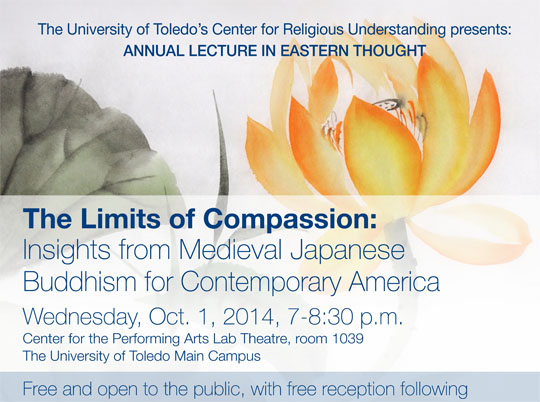There are several parallels that can be found in Medieval Japanese art and contemporary American society; that concept will be explored in The University of Toledo Center for Religious Understanding’s annual lecture in Eastern thought this week.
 University of Michigan Art History Professor and Associate Chair Kevin Carr will speak Wednesday, Oct. 1, from 7 to 8:30 p.m. in Center for Performing Arts Room 1039.
University of Michigan Art History Professor and Associate Chair Kevin Carr will speak Wednesday, Oct. 1, from 7 to 8:30 p.m. in Center for Performing Arts Room 1039.
The free, public talk titled “The Limits of Compassion: Insights From Medieval Japanese Buddhism for Contemporary America” will be followed by a reception.
“One of the things I’ve been looking at in Medieval Japan are how people formed conceptual maps of the world and how they used art to shape what the world looks like,” Carr said.
He explained that the conceptual maps he is referring to are the images in our minds of the relationships and ideas on which we place high importance.
“Let’s say you’re new to The University of Toledo and you’re really into the sciences,” he explained. “To you, the science buildings will be larger than the art museum, for example.”
Carr said he will transition from the topic of Buddhist conceptual maps to a comparison of compassion in modern American society and what it means to us today.
“Ultimately, I want to connect something very esoteric, like 13th and 14th century Japanese ideas, with something much closer to home,” he said.
When asked what he’d like the audience to take away from his presentation, Carr said: “I’d like them to think about the shape of their world in their minds; to try and reflect on what their worlds look like, and how those images affect their actions, who matters and why, and how those maps in their head were created. I’m hoping they go away with a little more cognizance that they’ve created circles of compassion and those aren’t necessarily inevitable.”
Free visitor parking will be available in areas 12, 12S and 12W.
For more information, click here.